Kazuya Oki volunteers to undergo cybernetic surgery at the International Space Development Program in the USA, who aim to create an astronaut able to survive in space without the need of an external suit. After a successful operation, he is given the codename "Super 1" - displaying a wide variety of new abilities to help him explore the depths of space. However the Dogma Kingdom, an evil organisation wishing to purge the weak and unworthy from the world in order to create a utopia, are also aware of the project. When lead scientist Professor Henry refuses to hand Kazuya over, Dogma retaliate by destroying the research centre - with only Kazuya surviving.
Returning to Japan, Kazuya travels to the Chichibu Mountains to train in the Sincere Shaolin Fist under the great martial artist Master Genkai. Unlocking his potential to transform into Kamen Rider Super-1, Kazuya then battles against the Dogma Kingdom to avenge the scientists and protect Japan from their evil schemes. But from their ashes another evil rises, and soon Kamen Rider Super-1 must face the wrath of Jin Dogma!
From its very first episode it's clear that Kamen Rider Super-1 is a series with a lot of ambition. While retaining the standard "cyborg augmentation" origin story of the Showa Riders it does so with a renewed vigour - Kazuya choosing willingly to become Super-1 rather than having it forced upon him. The first episode debuts the titular hero with a slick sci-fi edge, showing off his impressive power set in a test setting before launching into the tragedy that shapes the hero. It's a premiere that surprisingly takes its time, spreading the main backstory across two episodes rather than cramming it all into the first half of one so that the rest can cover the hero's debut. Though they may seem diametrically opposed, the sci-fi element of the International Space Development Program and the more traditional martial arts theme of the Sincere Shaolin Fist blend together within the story itself.
Super-1 himself is also a pretty great-looking Rider. The sleek silver colour scheme combined with the wasp motif really well the design as a more sci-fi Rider despite not actually straying away at all from all the familiar conventions Kamen Rider had used in previous years. The big shake-up instead comes in the form of the Five Hands - five distinct power-up abilities Super-1 has that feel almost like an intermediary point between the more basic Riders of the past and the multiple form approach of later years. Channelled through different coloured gloves, these abilities include his standard Super Hands, strong Power Hands, supercharged Elec Hands, hot and cold blasting Thermal Hands and finally projectile-launching Radar Hands. Super-1 even has two different motorcycles from the very beginning - the more elaborate and technical V-Machine as well as the Blue Version, a dirt bike used for rough terrain action sequences. He even has his own underground base where a computer performs maintenance checks on him after every battle. Behind the mask is Kazuya, played by Shunsuke Takasugi. Later actions of the actor aside (definitely look up if you aren't already aware), on paper Takasugi seems a good fit for the character having practiced martial arts in real-life as well. That said Kazuya doesn't especially stand out among the pantheon of Kamen Rider heroes, and as the series starts to distance itself from the backstory that made him interesting in the first place the less notable he becomes. He covers all the key bases of your typical Showa era protagonist, but lacks that charisma which makes all the best ones truly memorable. While the show does attempt to make Kazuya a little more personable by having him teach breathing techniques prior to the next episode preview (similar to how Hiroshi would dispense life tips in Skyrider), that is very quickly dropped.
No Rider goes at it alone though, and Super-1 actually proves very good at keeping a core cast of supporting characters - some of who even stick around until the very end. Outside of the movie Super-1 keeps a link to the franchise at large through the reappearance of Genjirō Tani and his assistant Masao "Choro" Kozuka - both of whom debuted in Skyrider. While Choro's role as the comic relief sidekick hasn't really changed since the previous series, Genjirō has at least settled better into a mentor-like role - now operating a motorcycle repair shop that mirrors the way Tobei Tachibana used to hop around professions in the earlier shows. While Genjirō still lacks the screen presence and instant likeability of his predecessor, he certainly feels far more at home here than he did in Skyrider. Joining them for the duration of the series is Harumi Kusanami, along with her younger brother Ryo. Harumi progresses rather nicely over the course of the series, becoming more involved in storylines as time goes on. Kazuya also receives continued support from the Sincere Temple beyond the show's introduction, seeking guidance and training from Master Genkai as well as his disciple Benkei in times of need. It's nice to see this element isn't lost as it provides Kazuya with a more interesting direction to go in whenever those types of story come up. It's just a shame that Professor Henry couldn't have stuck around longer, because the stern-talking American scientist definitely leaves a lasting impression despite only appearing in a single episode.
Though at their core the Dogma Kingdom might not seem all that different from all the other evil organisations that plagued the previous Kamen Riders, what sets them apart is the angle they come at it. From the very outset Dogma's aim is to create a utopia populated only by those they deem worthy, and (for the most part) every scheme they carry out is in aid of that. It's a take that in a more developed series might give them a little more nuance, but here it's just nice to see how they link their plans back to this ultimate goal each episode. The organisation is led by Terror Macrow, a villain who for the most part sits ominously in his throne barking orders and looking sinister. Doing all the legwork is General Megarl, a cybernetic humanoid whose twisted body of metal parts makes a nice foil to the sleek look of Super-1. Though for the most part Megarl doesn't really step out of the comfort zone of a typical Kamen Rider villain general either, the show packs in some really good backstory into his final appearance - easily one of the standout episodes of the entire series. It's the kind of thing that could (and should) have been woven into the series for a lot longer, even if it was teased out slowly to adhere to the more episodic nature of shows of this time.
But while all the potential may be there, Kamen Rider Super-1's biggest hindrance is the fact that for the most part it's just dull. The whole series is just stock tokusatsu storytelling at the most basic level, echoing the unfair complaint that Showa Kamen Rider is so formulaic that the shows are practically interchangeable. Despite the martial arts motif the in-suit action isn't really a step above anything the franchise was already doing in previous shows, although the inclusion of the Five Hands do add a little bit of unique flavour. But even then so much of it just lacks energy. Take Kazuya's transformation pose for example - which the motions themselves look great and go brilliantly with the character's martial arts background, a lot of the time it feels so slow and methodical that it completely takes you out of the moment.
Like so many of the Kamen Rider series from this era Super-1 also falls victim to a mid-series retool, although unlike its predecessor this did not stem from flagging ratings. Following a programme reorganisation at television station TBS Super-1 found itself with a new time slot, and concerned that this might affect the show's younger audience its staff reviewed the series in order to compensate. The Dogma Kingdom was replaced by Jin Dogma - led by Marshal Demon and his four generals Princess Yokai, Commander Onibi, Doctor Ghost and Staff Officer Witch. Genkai and Benkei were also removed from the show, with Kazuya now receiving support from the Junior Rider Squad - an intrepid team of youths akin to the Kamen Rider Kid Corps that appeared in both the original Kamen Rider and Kamen Rider V3. The tone of the show also became much lighter, with sillier plot lines and monsters. They even finally speed up Kazuya's transformation pose a bit! In many ways, Super-1 begins to feel like an entirely different show.
With Genkai and Benkei gone naturally the callbacks to Super-1's martial arts origins begin to decline, but in addition to that the space elements begin to disappear as well. Kazuya stops visiting his underground base, never to receive a cybernetics check-up from the medical check machine again until the last few episodes when all these elements inexplicably come back to the show (again, not uncommon for this era). Stories instead become more focussed around the Junior Rider Squad, with one or more members getting into trouble to kick off the plot or them taking the lead on investigating a Jin Dogma plot only to end up needing to be rescued by Kazuya. As such there's a good string of episodes where Kazuya completely takes a backseat, only really appearing whenever Super-1 needs to be called into action. The changes made to the show were apparently enough to stop its ratings suffering too hard so presumably they do resonate with younger audiences better, but for anyone else it may move the needle too far in the other direction.
The use of the Junior Rider Squad isn't inherently a bad thing either - both the original and V3 made excellent use of their equivalents in a way that didn't overshadow their protagonists. The Squad themselves aren't awful either, they just don't have the right energy suited to carrying a whole episode themselves. Youngest member Masaru proves to be a lot of fun, although it's uncertain how much of his hilariously nonchalant personality and often biting delivery comes from the fact the actor seems so young he possibly didn't know what was going on half the time. This shift toward the supporting characters having greater focus also gives Harumi more to do, as she acts as captain to the group. Genjirō and Choro's roles don't really change all that much, though they do get more of a chance to be part of the action from time to time. Episode 42 is a particular highlight, where the gang crash a costume party Marshal Demon has put on for all the Jin Dogma staff. Super-1 never really gets out of the monotony it had in its first half, but when it comes up with a wild enough storyline it does have a lot of fun with it.
That mediocrity unfortunately stretches to Jin Dogma as well. As the first half of Super-1 failed to do anything interesting with General Megarl and the Dogma Kingdom until the very end, Jin Dogma and the bickering antics of its generals feel like a breath of fresh air at first. More generals has the potential to offer more variety to the series, and it's nice to see some female ones not only added to the mix but also stand on equal-footing to their male contemporaries as well. As well as the overall tone shift there are lots of little touches about that suggest a more light-hearted approach, such as the over the top trumpet fanfare that plays every time Marshal Demon enters a room. However it really doesn't take long for the realisation to set in that Jin Dogma might actually be more boring than their predecessors. While the larger cast might allow for more interesting dynamics, at least the Dogma Kingdom had a hook that made them somewhat interesting. Sure the idea of them wanting to create their utopia could have been more fleshed out, but it wasn't something that was forgotten about during their tenure. Jin Dogma enter the scene as the shadowy organisation that ruled behind them, but their motivation couldn't be any less generic - they're just another evil group that want to rule the world because they're evil. That's a perfectly fine motivation for Shocker and all the facsimiles that appeared in subsequent shows, but when Super-1 has already offered something a little more unique it's hard to go back.
Kamen Rider Super-1 is indeed a series of two halves, and while they may have quite the contrast they are united in the fact that neither are able to live up to their potential. The foundations were there for something great, but flat characters and generic storylines result in a by-the-numbers series that's far better in theory than it is in execution. Having run for a decade by this point Kamen Rider had built itself on a tried and tested formula, but Super-1 (and to a lesser extent Skyrider) clearly mark a point where it was beginning to become stagnant. Outside of the Birth of the 10th! Kamen Riders All Together!! special in 1984 it would be another six years before Kamen Rider returned for another full length series, but when it did it would be with one of the most beloved entries in the entire franchise.



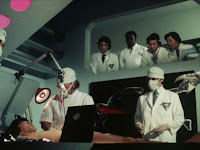

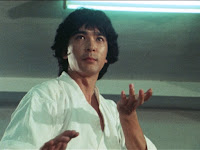
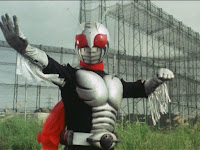
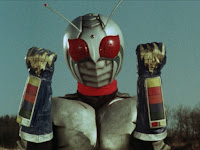
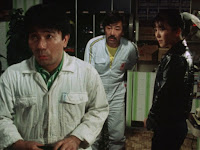
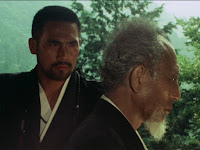
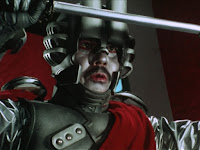
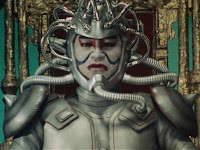
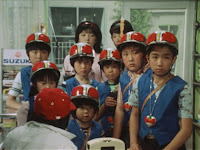
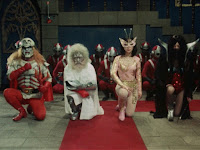
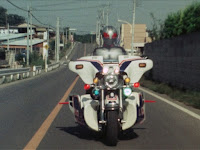

3 comments:
Now you reviewed all Rider shows. Also, are you going to do a review of Dogengers Metropolis? A new Dogengers show was announced.
I am! Metropolis is next on the list!
So...You know Zein in a recent episode of Gotchard used Super-1's card. The timing is a bit sus you know...
Post a Comment